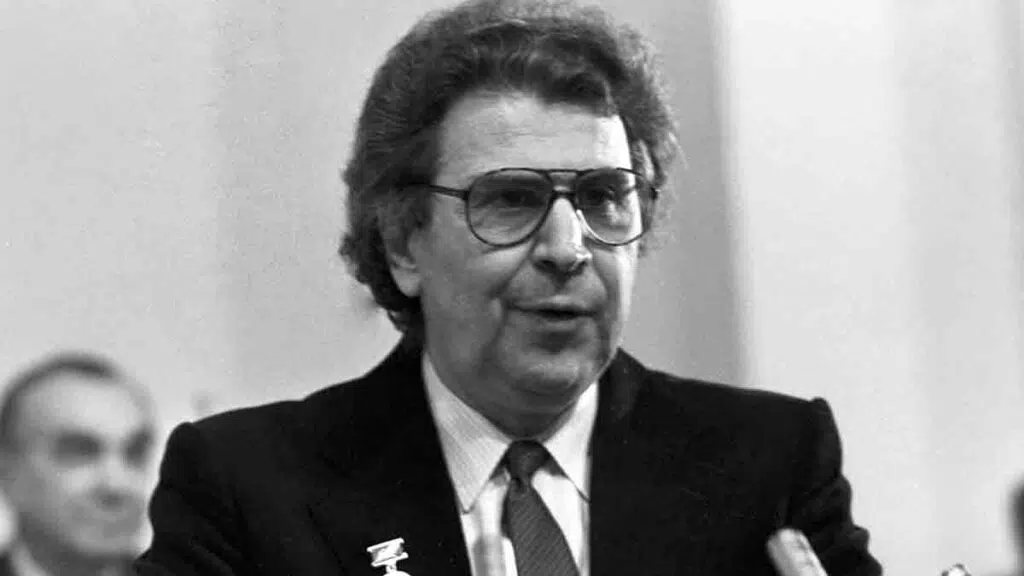Mikis Theodorakis is a Greek composer, musician, public and political figure. His life consisted of ups and downs, full devotion to music and the struggle for his freedom. Mikis - "consisted" of brilliant ideas, and the point is not only that he composed skillful musical works. He had clear beliefs about what Greece should look like. He devoted most of his life to the theme of the struggle for democracy.
First of all, he is known as the creator of classical music, as well as songs and music for dances in the folk style. The world popularity of the maestro was brought by the music for the film Zorba the Greek by Michalis Kakoyannis, which was released in the mid-60s of the last century.
For the presented tape, the composer composed a melody for the sirtaki dance. Today, many mistakenly attribute sirtaki to Greek folk dances. In fact, it was created specifically for the film "Zorba the Greek" based on the ancient Greek warrior dance - hasapiko.
Childhood and youth of Mikis Theodorakis
Maestro's date of birth is July 29, 1925. The future composer was born in the community of Chios (an island of the same name in Greece). He was brought up in an ordinary family. His parents instilled in him a good upbringing and a love of art.
From adolescence, he trembled with music. Mikis Theodorakis learned to play the piano and founded his own choir around the same time. He was predicted a good future. Parents could not get enough of the success of their offspring. Soon he began to compose the first author's musical works.
The war years turned out to be incredibly difficult for Mikis: he was part of the resistance movement against the Nazis who occupied Greece. In one of the interviews, he spoke about the torture and psychological pressure that the military put on him. After World War II, Mikis took an active part in the civil war. Theodorakis ended up in a concentration camp several times. Twice he was buried alive and the same number of times he got out.
Theodorakis had a will to live. He had a clear political and life position, which he never changed. He fought for his own freedom and democracy in his native country.
Despite a number of tragic circumstances, he did not leave music. After some time, the talented young man became a student at the Athens Conservatory. He chose the faculty of composition for himself. Then he went to the capital of France. In a new place, the young man honed musical analysis and conducting.
The creative path of Mikis Theodorakis
The first period of creativity fell on the war years. He composed "heavy" pieces of music, saturated with notes of pain and suffering. The second period of music came when the composer moved to Paris. In the musical works of this period, one feels a surge of vitality and optimism.
When he returned to Greece, the first thing he did was to become the founder of a musical society and an orchestra. At this time, he holds a number of speeches and gains weight in society. At the same time, Mikis was elected as a deputy to parliament.

The peak of the composer's activity falls on the 60s of the last century. During this period of time, he published a number of musical works, which today are considered classics. This includes the opera The Quarter of Angels, the ballet Orpheus and Eurydice, and, of course, the oratorio It Is Worthy to Eat.
He also distinguished himself as a film composer. Mikis did not miss the opportunity to work with theater and film directors. His music has repeatedly accompanied performances and a number of brilliant films.
Political beliefs of Mikis Theodorakis
The maestro was a representative of the left-wing democratic party. He entered the so-called "black list" of the authorities after the junta regime was established in Greece.
Mikis Theodorakis was forced to hide from the current government. The composer was threatened. He was pursued. Representatives of the authorities did their best to wipe his name off the face of the earth. The maestro's compositions were banned throughout the country, and Mikis himself was placed in prison.
Then he was sent to Paris, where he continued to serve his term. Then came the worst - a concentration camp in the suburbs of Athens. Cultural figures from all over the world raised the issue of the composer's illegal arrest. Only after the case reached a resonance, the government softened.
A few years later, Mikis was released. He managed to get to the territory of France. From this period of time, he again takes up music. He tours a lot and promotes the restoration of democracy in his country. The Greek composer is one of the main symbols of resistance to the dictatorship. He returned to Greece only after 4 years. It was then that the fall of the junta regime took place.
In his country, the maestro was elected a member of parliament several times. He worked in government ministries. He had a clear idea of what Greece should be like. The composer did not want to see terrorism and illegal drugs in the country. He fought for the preservation of the environment, good health care and a decent education.
The maestro also did not leave music. He continued to create. During this period of time, he composes an impressive number of musical works. Over the years of creative activity, he published 1000 compositions and two dozen records. His work is respected not only in his native country. The works of Mikis found their listeners in Europe, America, Ukraine, Russia.

Mikis Theodorakis: details of the maestro's personal life
The composer has repeatedly said that he is monogamous and an avid family man. He met his love while studying at the conservatory. He tied the knot with Mirto Altinoglu. A son and a daughter grew up in this family.
He idolized his wife, and she, in turn, was faithful to him. She supported her husband in everything. Mirto often toured with her husband and emigrated with him to Paris during the junta.
Interesting facts about the composer Mikis Theodorakis
- He composed not only music, but also poetry. In addition, he became the author of an autobiographical book.
- Until the end of his days he remained a communist.
- The maestro's songs were performed by The Beatles.
- He had excellent mathematical skills. As a child, he studied the exact sciences, but, in the end, he chose a creative profession.
- In the mid-40s of the last century, at one of the demonstrations, he was so beaten that the guy was confused with the deceased and taken to the morgue.
Death of Mikis Theodorakis
Since 2019, he has had serious heart problems. In the same year, the composer underwent surgery. The doctor installed the maestro pacemaker.
He passed away on September 2, 2021. He fought for his life for a long time, but in the end, Mikis' heart gave out. The cause of death of the composer and an active public and political figure was a long illness. His heart stopped at the age of 96.



